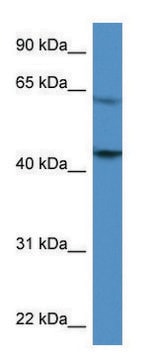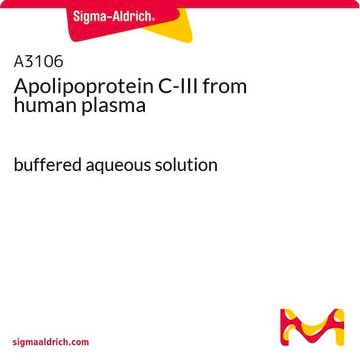SAB4500823
Anti-PAR1 (Cleaved-Ser42), N-Terminal antibody produced in rabbit
affinity isolated antibody
Synonyme(s) :
CXCR-7, CXCR7, G-protein coupled receptor 159, G-protein coupled receptor RDC1, chemokine orphan receptor 1
About This Item
Produits recommandés
Source biologique
rabbit
Conjugué
unconjugated
Forme d'anticorps
affinity isolated antibody
Type de produit anticorps
primary antibodies
Clone
polyclonal
Forme
buffered aqueous solution
Poids mol.
antigen 46 kDa
Espèces réactives
human
Concentration
~1 mg/mL
Technique(s)
ELISA: 1:20000
western blot: 1:500-1:1000
Numéro d'accès NCBI
Numéro d'accès UniProt
Conditions d'expédition
wet ice
Température de stockage
−20°C
Modification post-traductionnelle de la cible
proteolytically cleaved (Ser42)
Informations sur le gène
human ... F2R(2149)
Description générale
Protease-activated receptor-1 (PAR1), also known as coagulation factor II thrombin receptor (F2R), is encoded by the gene mapped to human chromosome 5q13.3. The encoded protein is a cell surface seven-transmembrane G protein coupled receptor.
Immunogène
Immunogen Range: 23-72
Application
Actions biochimiques/physiologiques
Caractéristiques et avantages
Forme physique
Clause de non-responsabilité
Vous ne trouvez pas le bon produit ?
Essayez notre Outil de sélection de produits.
Code de la classe de stockage
10 - Combustible liquids
Classe de danger pour l'eau (WGK)
nwg
Point d'éclair (°F)
Not applicable
Point d'éclair (°C)
Not applicable
Certificats d'analyse (COA)
Recherchez un Certificats d'analyse (COA) en saisissant le numéro de lot du produit. Les numéros de lot figurent sur l'étiquette du produit après les mots "Lot" ou "Batch".
Déjà en possession de ce produit ?
Retrouvez la documentation relative aux produits que vous avez récemment achetés dans la Bibliothèque de documents.
Notre équipe de scientifiques dispose d'une expérience dans tous les secteurs de la recherche, notamment en sciences de la vie, science des matériaux, synthèse chimique, chromatographie, analyse et dans de nombreux autres domaines..
Contacter notre Service technique







